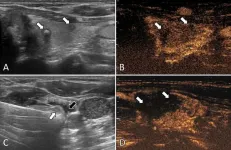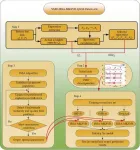(Press-News.org) Today the University of Phoenix Career Institute® released its 2024 Career Optimism Index®, a comprehensive study examining the state of American workers' career trajectories and sentiments about the future of their job and career opportunities. This year's Index, the fourth consecutive year it has been fielded, reveals that workers and employers are facing a critical moment of talent stagnation in the workplace.
More than half (53%) of Americans report feeling easily replaceable in their job position and 64% of workers say their company does not offer opportunities for internal mobility. Meanwhile, 44% of employers say their top challenge to finding talent in the past year is a lack of well-qualified applicants. These findings indicate that employers are not looking internally and, thus, overlooking the potential to upskill and elevate their existing workforce to solve business needs, hindering talent progression for both workers and organizations.
What The Workforce is Saying
The last year of layoffs, strikes, and economic uncertainty has caused tension for workers: 42% reportedly worry about losing their job due to a bad economy and 38% of workers agree that their salary or wage has not increased at the same rate as inflation. Additionally, Americans have a negative outlook on their financial security, with 42% saying they can afford less now than they could two years ago.
More than half (53%) of Americans say they are easily replaceable - a third of workers don’t feel recognized by their company’s leadership for their contributions (30%) and 27% do not feel empowered in their current job.
There is a wide disconnect between employer perceptions and worker realities on opportunities for advancement: While 62% of employers say their company currently offers opportunities for internal mobility, only 36% of workers agree. Additionally, 90% of employers say their company provides workers with opportunities for career development, but only 69% of workers agree this is their experience.
However, workers do see a need to continue acquiring skills and they highly value employer investment in skilling: 74% say they must continuing learning new skills to stay ahead in their career and most say if their company did more to upskill (66%) or reskill (65%) them, and gave more opportunities to apply new skills (69%), they would be more likely to stay throughout their career.
Yet, with a lack of career support, workers are feeling stagnant: Workers are more than twice as likely to feel like they do not have the ability to advance in their career at their current job when their company does not currently provide a mentorship program (49% vs. 18%), skills development opportunities (55% vs. 23%), internal mobility (55% vs. 19%), or career path guidelines (53% vs. 19%).
Despite stagnation, workers continue to feel optimistic about their abilities—a belief in themselves to propel the future of their careers— which is an opportunity for employers to capitalize on that optimism: 78% of Americans are hopeful about the future of their career and 72% feel in control of their professional future.
What Employers are Saying
Employers today are making fewer hires, so when they are recruiting, they are seeking the perfect match for the skills they require. However, they are struggling to find the right fit externally:
62% say their company has experienced slowed or declining hiring over the past year through hiring freezes, layoffs, restructuring, etc. Only 19% say their company expects to hire 51+ people over the next year (vs. 25% in 2023).
51% of employers report that in the past year, it took one month or more to fill an empty position at their company.
Employers report the top challenge to finding talent in the past year was a lack of well-qualified external applicants (44%).
“As U.S. companies cut jobs and reduce expenses, they are fixating on the next best thing available to them outside of their organization to drive growth. This perspective is perpetuating a stagnant talent environment,” said John Woods, Provost and Chief Academic Officer, University of Phoenix. “Our Career Optimism Index® illustrates that business leaders are overlooking the immense potential of the workforce within their own organizations, who remain resilient and optimistic despite the macro environment. These workers possess a significant desire to advance and acquire the skillsets employers are seeking to fortify their businesses for the future.”
What Employers Can Do
By providing clearer and more flexible opportunities for their existing workforce to advance internally, employers have the opportunity develop the dynamic talent they need from within, serving business objectives and workers’ career ambitions.
Close Gaps in Awareness Around Internal Growth Opportunities: While there is a vast disconnect between employer perceptions and worker realities regarding opportunities for advancement, workers who do have awareness of career support options report high levels of satisfaction with them.
This is reflected across opportunities for internal mobility (82%), conversations with their manager/boss about their career path (86%), visibility with upper management/leadership (88%), networking opportunities (86%), and help/mentoring in their careers (87%).
Create a More Personalized Workplace Experience: Workers benefit from enhanced job performance and career advancement when their workplace experience is highly tailored to the ways they want to work and learn.
51% of Americans need support in setting career goals.
40% of Americans would prefer the flexibility of learning on their own without a course (e.g., reading a book about skills, personal projects, videos/tutorials on YouTube) when it comes to getting the skills they need for their career.
Workers who do have the flexibility to choose what they work on at their job are more satisfied at their current job than those who don’t (86% vs. 66%).
78% of workers feel they are more productive at their job when they have more flexibility.
The Value of Optimism
What’s more, the addition of statistical modeling to this year’s report reveals that if employers don’t adjust to solve talent stagnation, they’ll miss out on significant business savings: up to $1.35T across businesses and organizations in the U.S.
By investing in low-cost, high-impact tools and resources for employees to achieve their career goals including career pathing, skilling, and mentorship, employers can save up to $6,521 through increased productivity, $916 through decreased turnover, and $616 through decreased healthcare costs per employee per year.
Workers can similarly add up to $5,270 to their annual salary by investing in their own career pathing, skilling, and mentorship.
Housed within the University's College of Doctoral Studies, the University of Phoenix Career Institute® conducts research to inform problem-solving, and partners with leading organizations such as Jobs for the Future (JFF) to break down systemic barriers that Americans face in their careers. The Institute has committed to fielding the Career Optimism Index® study every year, sharing the results broadly to help inform societal solutions to career advancement and workplace equity, including a recent partnership with Motherly to study the unique career support required to uplift lower-income working mothers and ongoing work with Give An Hour to breakdown workplace mental health challenges through the creation of a workplace mental health toolkit.
For more information about the University of Phoenix Career Institute® and the complete Career Optimism Index® Study, visit www.phoenix.edu/career-institute.
ABOUT THE CAREER OPTIMISM INDEX®
The Career Optimism Index® study is one of the most comprehensive studies of Americans' personal career perceptions to date. The University of Phoenix Career Institute will conduct this research annually to provide insights on current workforce trends and to help identify solutions to support and advance American careers and create equity in the workplace.
For the fourth annual study, fielded between December 5, 2023-January 2, 2024, surveyed more than 5,000 U.S. adults who either currently work or wish to be working on how they feel about their careers at this moment in time, including their concerns, their challenges, and the degree to which they are optimistic about their careers. The study was conducted among a nationally representative, sample of U.S. adults and includes additional analysis of the workforce in the top twenty DMA markets across the country to uncover geographic nuances. The study also explores insights from 501 U.S. employers to provide comparison between the workforce and those who hire, train, and retain them.
Additionally, for the first time, a statistical modeling analysis was conducted to illustrate how employers and employees can benefit financially from investing in career optimism.
To determine Worker Value, “The Value of Career Optimism,” analyzed survey data metrics from the 2024 Career Optimism Index® study to measure the worker’s financial value of optimism and used econometric analysis to identify the boost in employee income that comes from having optimism.
To determine Employer Value, the report connected survey data from the 2024 Career Optimism Index® study with external, third-party data about the US workforce to link optimism to employer costs and compared the differences between employer costs for optimistic versus non-optimistic employees.
The total US opportunity cost was determined by looking at the full-time employee population in U.S. workforce and extrapolating the proportion who are unoptimistic from the 2024 Career Optimism Index survey results. The benefit for employers is calculated by taking the full-time employee population and applying the per employee annual savings from career optimism.
Additional details about methodology can be provided upon request.
ABOUT THE UNIVERSITY OF PHOENIX CAREER INSTITUTE®
University of Phoenix Career Institute™ was created to address broad, persistent, and systemic barriers to career advancement through research-based solutions and impactful partnerships that break down barriers Americans face in their careers.
About University of Phoenix
University of Phoenix innovates to help working adults enhance their careers and develop skills in a rapidly changing world. Flexible schedules, relevant courses, interactive learning, skills-mapped curriculum for our bachelor’s and master’s degree programs, and a Career Services for Life® commitment help students more effectively pursue career and personal aspirations while balancing their busy lives. For more information, visit phoenix.edu.
MEDIA CONTACT
Sara Silberman, sara.silberman@edelman.com, 714-747-0201
Amy Lindquist, amy.lindquist@edelman.com, 773-459-2065
END
The 2024 Career Optimism Index® study highlights shift from the great resignation to a great talent stagnation – and how employers can break through
The study was conducted by the University of Phoenix Career Institute®, part of the University’s College of Doctoral Studies, which examines workforce dynamics to inform solutions that help break down barriers to career advancement
2024-04-02
ELSE PRESS RELEASES FROM THIS DATE:
Minimally invasive procedure may spare patients from thyroid surgery
2024-04-02
OAK BROOK, Ill. – In a 10-center study, microwave ablation offered progression free survival rates and fewer complications than surgery in the treatment of a form of thyroid cancer known as papillary thyroid carcinoma (PTC), according to research published today in Radiology, a journal of the Radiological Society of North America (RSNA).
The most common type of thyroid cancer, PTC often presents with multifocality, meaning that two or more bumps or nodules (papillae) are found within the thyroid gland. The occurrence of multifocality within PTC cases is notably frequent, ranging between approximately ...
Noted UCLA neurologist Dr. Rhonda Voskuhl wins 2024 John Dystel Prize for multiple sclerosis research
2024-04-02
[New York, April 2, 2024] – Rhonda Voskuhl, M.D., an internationally recognized neurologist and investigator at the University of California, Los Angeles, is the winner of the 2024 John Dystel Prize for Multiple Sclerosis Research. She is being recognized for her innovative research to understand mechanisms underlying sex differences in multiple sclerosis (MS) and advancing women’s health.
Women are much more susceptible than men to developing MS, an immune-mediated neurological disease. Voskuhl has conducted extensive basic and clinical research ...
Novel vaccine, PfSPZ-LARC2 Vaccine, to prevent malaria infection developed by Seattle Children’s Research Institute and Sanaria ready for human testing
2024-04-02
April 2, 2024 – In a report published on March 21, 2024 in EMBO Molecular Medicine (A replication competent Plasmodium falciparum parasite completely attenuated by dual gene deletion) investigators at Seattle Children’s Research Institute and Sanaria Inc. describe the development of a whole malaria parasite vaccine strain that infects the liver, develops to the late liver stage, and then gets completely stuck and cannot burst out of the liver to cause symptomatic blood infection. The creation of this strain called LARC2 (Late liver-stage Arresting, Replication Competent) was accomplished by deletion of only two parasite genes out of the approximately 5,000 in the ...
A hybrid data driven framework considering feature extraction for battery state of health estimation and remaining useful life prediction
2024-04-02
A paper proposing a hybrid data driven framework considering feature extraction for battery state of health estimation and remaining useful life prediction was published in the journal Green Energy and Intelligent Transportation on 29 March 2024.
VMD is used for completely non-recursive modal variation to deal with signals. The optimal solution of the variational problem is obtained finally by effective decomposition component of the given signal. By iteration, the VMD algorithm can decompose the signals into some intrinsic ...
Press passes available now for NUTRITION 2024 to be held June 29–July 2
2024-04-02
Complimentary press passes are now available for NUTRITION 2024, the annual flagship meeting of the American Society for Nutrition. Join us June 29–July 2 in Chicago for the latest developments in nutrition research, practice and policy.
As the pre-eminent meeting in nutrition science, NUTRITION attracts thousands of scientists, practitioners, policymakers, advocacy leaders and industry professionals each year. Reporters are invited to attend in person to connect with the field’s leaders and learn about exciting scientific ...
UMass Amherst-led team creates biofilm-resistant glass for marine environments
2024-04-02
AMHERST, Mass. – A group of researchers led by University of Massachusetts Amherst engineers have created ultraviolet (UV) rays-emitting glass that can reduce 98% of biofilm from growing on surfaces in underwater environments, as reported in the journal Biofilm.
Biofilm is a slimy layer of various types of microorganisms that grows on wet surfaces. “If you look down your sink and touch the inner side of it—that slimy substance is biofilm,” describes Mariana Lanzarini-Lopes, ...
Heart health declines rapidly after menopause
2024-04-02
A woman’s cardiovascular risk can rise sharply after she goes through menopause, quickly catching up to men of a similar age and health profile, according to new findings presented at the American College of Cardiology’s Annual Scientific Session. Researchers said the study underscores the importance of recognizing and addressing early warning signs of heart disease risk in women as they lose the protective effects of estrogen after menopause.
“This is a unique study cohort of only post-menopausal ...
Majority of people with heart disease consume too much sodium
2024-04-02
Individuals with heart disease stand to gain the most from a low-sodium diet but, on average, consume over twice the recommended daily sodium intake, according to a study being presented at the American College of Cardiology’s Annual Scientific Session.
Sodium is an essential nutrient, but consuming too much can raise blood pressure, which damages blood vessels and forces the heart to work harder. Excess sodium can also cause the body to retain fluid, exacerbating conditions like heart failure. The current U.S. Dietary Guidelines put out by the U.S. Department of Agriculture ...
Study links e-cigarette use with higher risk of heart failure
2024-04-02
People who use e-cigarettes are significantly more likely to develop heart failure compared with those who have never used them, according to one of the largest prospective studies to date investigating possible links between vaping and heart failure. The findings are being presented at the American College of Cardiology’s Annual Scientific Session.
Heart failure is a condition affecting more than 6 million U.S. adults in which the heart becomes too stiff or too weak to pump blood as effectively as it should. It can often lead to debilitating symptoms and frequent hospitalizations as people age. Electronic nicotine products, which include ...
Mapping heart health: AI illuminates neighborhood impact on well-being
2024-04-02
Is the view from your doorstep mostly trees and sky or buildings and grass? The answer could influence your cardiovascular health, according to a study presented at the American College of Cardiology’s Annual Scientific Session. Using an analysis of Google Street View images powered by machine learning, researchers found people living in surroundings rich in sidewalks, trees and clear sky saw a significantly lower risk of major adverse cardiac events.
“A lot of research has shown that environmental factors strongly affect our health. If we can find a way to stratify this risk and provide interventions before cardiovascular events happen, then ...
LAST 30 PRESS RELEASES:
Bureaucracy Index 2026: Business sector hit hardest
ECMWF’s portable global forecasting model OpenIFS now available for all
Yale study challenges notion that aging means decline, finds many older adults improve over time
Korean researchers enable early detection of brain disorders with a single drop of saliva!
Swipe right, but safer
Duke-NUS scientists identify more effective way to detect poultry viruses in live markets
Low-intensity treadmill exercise preconditioning mitigates post-stroke injury in mouse models
How moss helped solve a grave-robbing mystery
How much sleep do teens get? Six-seven hours.
Patients regain weight rapidly after stopping weight loss drugs – but still keep off a quarter of weight lost
GLP-1 diabetes drugs linked to reduced risk of addiction and substance-related death
Councils face industry legal threats for campaigns warning against wood burning stoves
GLP-1 medications get at the heart of addiction: study
Global trauma study highlights shared learning as interest in whole blood resurges
Almost a third of Gen Z men agree a wife should obey her husband
Trapping light on thermal photodetectors shatters speed records
New review highlights the future of tubular solid oxide fuel cells for clean energy systems
Pig farm ammonia pollution may indirectly accelerate climate warming, new study finds
Modified biochar helps compost retain nitrogen and build richer soil organic matter
First gene regulation clinical trials for epilepsy show promising results
Life-changing drug identified for children with rare epilepsy
Husker researchers collaborate to explore fear of spiders
Mayo Clinic researchers discover hidden brain map that may improve epilepsy care
NYCST announces Round 2 Awards for space technology projects
How the Dobbs decision and abortion restrictions changed where medical students apply to residency programs
Microwave frying can help lower oil content for healthier French fries
In MS, wearable sensors may help identify people at risk of worsening disability
Study: Football associated with nearly one in five brain injuries in youth sports
Machine-learning immune-system analysis study may hold clues to personalized medicine
A promising potential therapeutic strategy for Rett syndrome
[Press-News.org] The 2024 Career Optimism Index® study highlights shift from the great resignation to a great talent stagnation – and how employers can break throughThe study was conducted by the University of Phoenix Career Institute®, part of the University’s College of Doctoral Studies, which examines workforce dynamics to inform solutions that help break down barriers to career advancement




